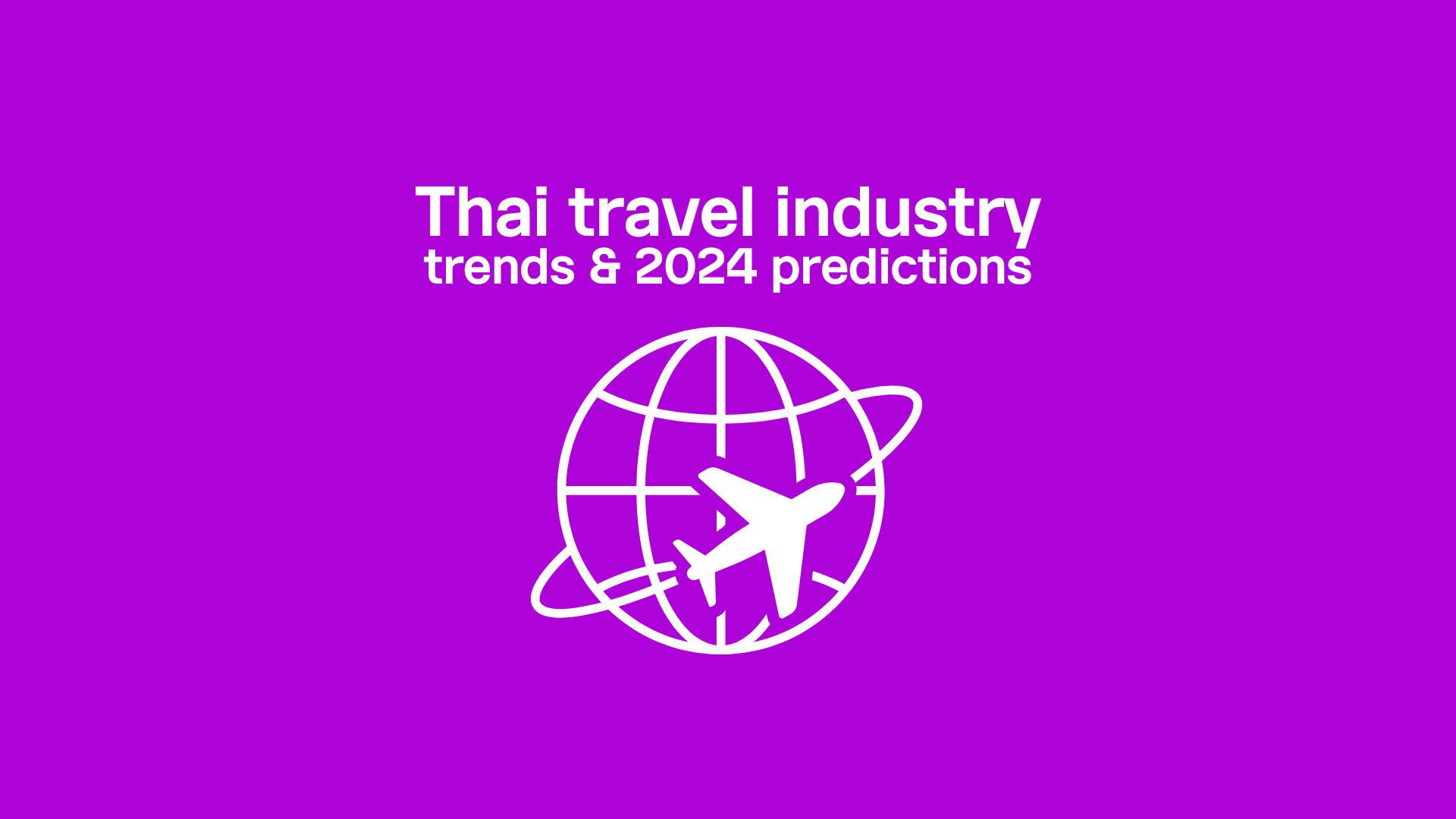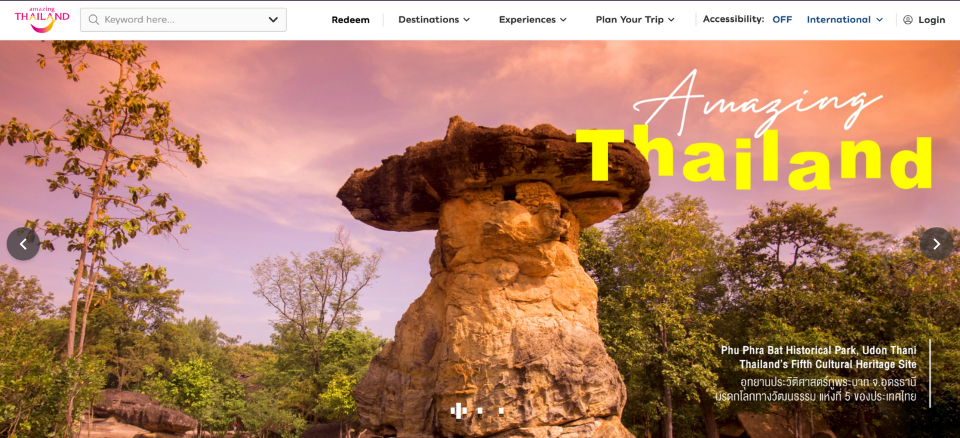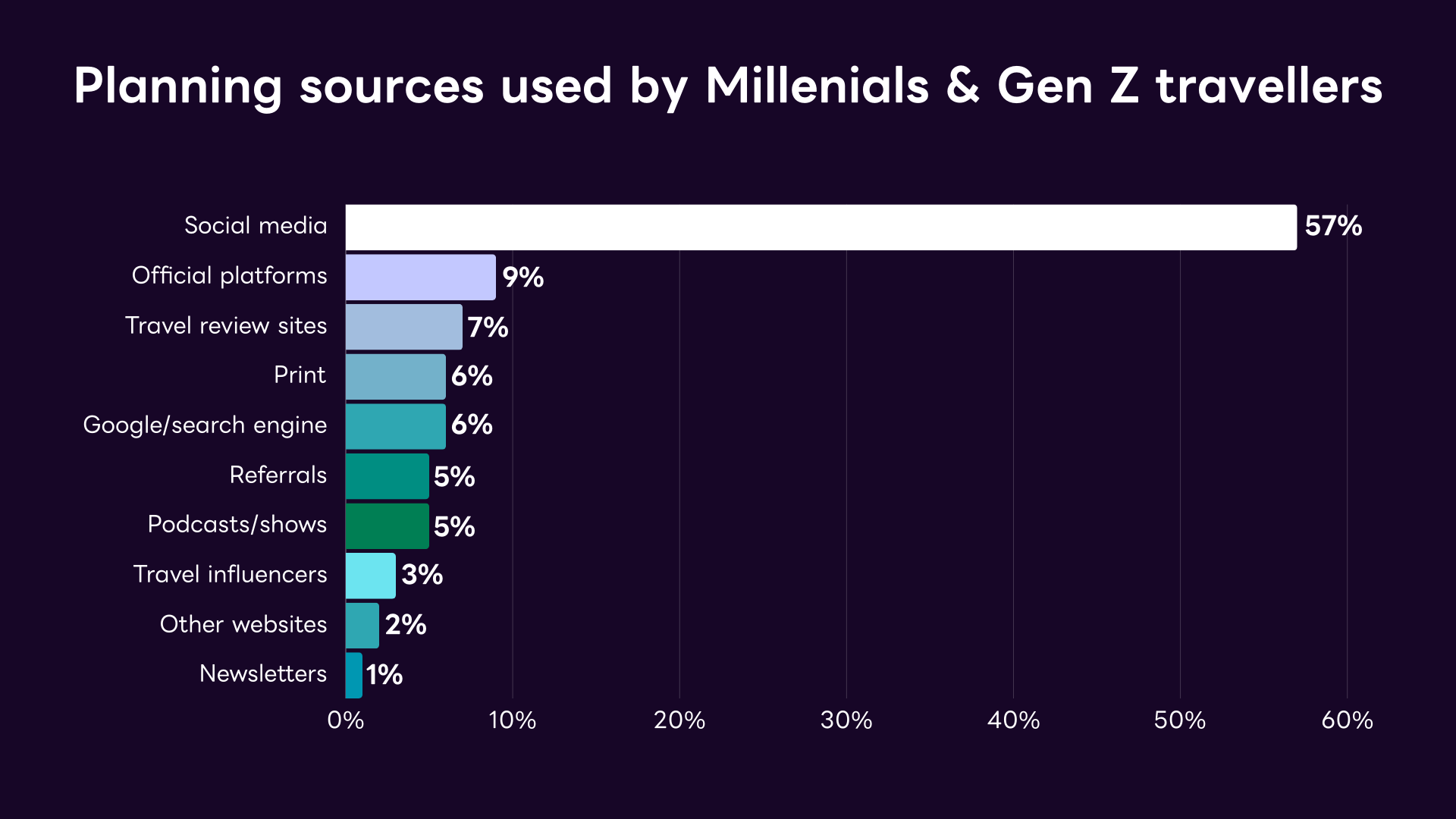Insights >
Tourism in Thailand: 2024 Trends and Predictions


New: 2025 Japanese Marketing Calendar | download for FREE >>


Thailand has long fascinated visitors with its lively culture, breathtaking scenery, and rich history. As the tourism business evolves, visitors and industry professionals must stay current on developing trends and future projections.
In this article, we’ll look at current tourist trends in Thailand, the impact of digital advertising, and industry predictions.
Thailand has a tropical savanna climate characterized by hot and rainy weather with four distinct seasons:
Each season in Thailand has its unique appeal for tourists. Even during the rainy season, Thailand’s brief showers typically do not significantly disrupt travel plans.
In addition, you can choose to travel to Thailand during festivals or major events of the year, such as:
Songkran Festival, also known as the water festival, is held from April 13 to April 15. This is an important holiday for the Thai people. You can join a great water fight to wash away the bad things from the old year.
 The Loi Krathong and Yee Peng lantern festivals, which take place just a few days apart in November, contrast peacefully with the hot water festival.
The Loi Krathong and Yee Peng lantern festivals, which take place just a few days apart in November, contrast peacefully with the hot water festival.

The best place to see the beautiful lights is the ancient capital of Chiang Mai. Tickets for the festival usually go on sale in June and sell out quickly. Visitors should book early through agents or Thai travel companies. This information pertains to tourism trends in Thailand.
Thailand has consistently utilised information technology in the tourism sector. This includes developing mobile applications to assist tourists and employing artificial intelligence and big data to enhance the travel experience and customer service.
Sustainable tourism is becoming a significant trend in Thailand. With growing global environmental concerns, travellers seek destinations that prioritize eco-friendly practices.
In response, Thailand’s government and local businesses are promoting sustainable tourism initiatives. For instance, the “Amazing Thailand Sustainable Tourism” campaign highlights eco-friendly resorts and activities aimed at minimizing environmental impact. This shift not only attracts environmentally conscious tourists but also supports the preservation of Thailand’s natural beauty.
The flexibility of remote work has led to a surge in digital nomads choosing Thailand as their home base. Cities like Bangkok, Chiang Mai, and Phuket are becoming popular among remote workers for their affordable cost of living, vibrant communities, and reliable internet connectivity. This trend has prompted the Thai government to explore visa options tailored explicitly for digital nomads.
As remote work becomes more common, Thailand will likely see continued growth in this sector.
The Digital Nomad Visa (DTV) allows holders to stay in Thailand for up to 180 days per entry and is valid for 5 years. It’s named the “digital nomad visa” because it is cost-effective and convenient for freelancers, digital nomads, or remote workers who want to work from Thailand’s tropical paradise.
Thailand’s reputation as a wellness destination is flourishing. From traditional Thai massages to comprehensive wellness retreats, the country provides a variety of health-focused travel experiences.
The global focus on mental and physical well-being has driven this trend. With tourists seeking destinations offering relaxation and holistic health options, Thailand’s dedication to wellness tourism is evident in the increasing number of high-quality wellness resorts and health-focused travel packages.
Cultural tourism remains a cornerstone of Thailand’s appeal. With its rich history, stunning temples, and vibrant festivals, Thailand attracts visitors interested in exploring its cultural heritage. Major cities like Bangkok and Chiang Mai, along with smaller towns, offer many cultural experiences.
The Thai government is investing in preserving historical sites and promoting cultural festivals to attract tourists seeking authentic cultural experiences.

Digital marketing has become a crucial tool for promoting tourism in Thailand. Social media platforms, search engine optimization (SEO), and targeted advertising are vital to successful digital marketing strategies.
Using these tools, tourism businesses can reach people worldwide, showcase Thailand’s attractions, and connect with potential visitors.

Source: Amazing Thailand
The Tourism Authority of Thailand uses digital marketing to attract tourists with visually appealing content and targeted ads. The company launched a new platform called ‘TAT Connex.’ This platform focuses on influencer marketing. It aims to improve the company’s digital strategy for promoting and developing tourism.
Influencer marketing has emerged as a powerful strategy for promoting Thai tourism. Tourism boards and businesses can reach a broader audience and build credibility by partnering with travel influencers and bloggers. Influencers share their experiences and recommendations with their followers, creating authentic content that resonates with potential travellers.
This approach has proven effective in showcasing Thailand’s diverse offerings and attracting tourists. The “Tat Connex” platform mentioned above is just one example. The platform, accessible via mobile apps and website, welcomes various influencers, including key opinion leaders (KOLs), bloggers, and celebrities.
These influencers can connect with tourism-related businesses across ten categories: hotels, homestays, restaurants, travel agencies, shopping centres, and tourist attractions.
In March 2024, the Tourism Authority of Thailand (TAT) invited 27 content creators from ASEAN and South Asian countries to participate in a media familiarization trip. This initiative is part of TAT’s campaign to promote Thailand’s attractions and soft power to international audiences.
Data-driven advertising is revolutionizing the way tourism businesses reach and connect with potential visitors. Companies can create better ads by studying consumer data and behaviour to tailor campaigns to their target audience.
For instance, personalized ads tailored to user interests and previous behaviour can enhance engagement and spur bookings. This strategy enables businesses to maximize their advertising budget and improve the efficacy of their marketing endeavours.
The Big Data Institute (BDI) began in February 2024. Its goal is to make Thailand a data-driven country within four years.
The institute plans to roll out a national data intelligence platform next year. It will enable state agencies to benefit from its data analytics process. Initially, it will cover around 30% of all major state agencies’ datasets before expanding to 90% by 2026.
Digital technology will continue to expand its integration into tourism. Virtual reality (VR) and augmented reality (AR) will significantly enhance the travel experience.
From virtual destination previews to AR-guided tours, these technologies will provide innovative ways for tourists to explore Thailand. As digital experiences become more sophisticated, they will offer immersive and engaging ways to attract and retain visitors.
Health and safety will remain top priorities for travellers and the tourism industry. Thailand plans to continue implementing and enhancing health protocols in response to ongoing global health concerns. This includes stringent sanitation measures, health certifications for accommodations, and easy access to medical services. Ensuring a safe and hygienic travel experience will be crucial in maintaining traveller confidence
In today’s age of digital transformation, promotion through social media platforms is increasingly essential. Thailand wants to attract 40 million visitors by 2024. As part of this goal, they plan to double the number of Chinese tourists to 8.2 million.
Read our blog on the LINE app in Thailand here →
Additionally, the Tourism Authority of Thailand (TAT) has partnered with TikTok Thailand for the “Amazing Thailand Passion Ambassador” campaign. This initiative invites travellers to create content that highlights more meaningful travel experiences. The project offers prizes worth THB 2 million to encourage more travellers to visit Thailand and increase engagement.

Source: Skift Research
Skift Research’s report on Gen Z and Millennial travel shows how digital platforms affect their travel choices. It came out in January. It found that 57% of respondents rely on social media channels for travel planning.
Personalized travel experiences will become more prevalent, driven by advances in technology and data analytics. Travelers will seek customized itineraries and experiences tailored to their preferences. Thailand’s tourism industry expects to leverage data to offer bespoke recommendations and services, enhancing the visitor experience.
Thailand’s tourism industry is evolving in response to new trends and future forecasts, influenced by sustainability, digital advancements, and changing traveller preferences. As digital marketing and advertising become increasingly crucial, the industry must innovate and effectively engage potential visitors through digital strategies.
By keeping up with these trends and utilizing emerging technologies, Thailand can maintain its appeal and satisfaction for tourists worldwide.
At DMFA, we provide LINE support services in Thailand, Japan, and Taiwan.
 Contact our team for further information if you want to promote your business on LINE.
Contact our team for further information if you want to promote your business on LINE.
Simply fill in the form and our team will get back to you as soon as possible →